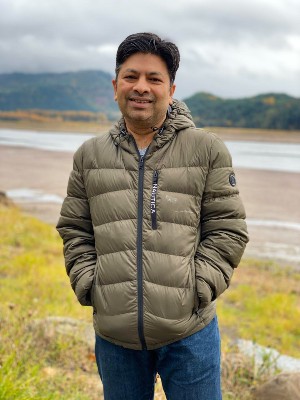
For Dr. Rupesh Agrawal, all roads lead to data. His path started in India where, as the eldest of 13 children, he was the first to graduate from college, inspiring his siblings to follow with similar endeavors of their own. Dr. Agrawal recently joined the business informatics department at Northern Kentucky University (NKU), teaching in the online Master of Science in Health Informatics (MHI) program.
He spent the previous 10 years at Oklahoma State University (OSU), where he completed his Ph.D. He also holds an MBA in finance with a concentration in data analytics.
Dr. Agrawal started his career as a mechanical engineer working with several major manufacturing firms, like Caterpillar and Peterbilt, designing large machinery. He also spent time with Gardner Denver in the oil and gas field, where he developed drilling rig machinery, from the compressor to the fracking pump.
Managing large-scale projects led Dr. Agrawal to further study the business models behind industrial manufacturing. He was keen to apply Lean Six Sigma principles to increase productivity by utilizing statistical data.
His work is in the informatics space, which influences the analytics and business of healthcare. He uses this approach with electronic health records to benefit clinical outcomes.
“My research is in healthcare, health analytics, data science, information science. My research involves using large electronic health records to do analytics and improve clinical health,” Dr. Agrawal said.
Immersed in the Numbers
Before joining the faculty of NKU, he worked with OSU’s Center for Health Sciences. Also, he sits on the Great Plains Sleep Specialists board, where he has overseen sleep health education, analytics and R&D.
This work has led him to become “fully immersed in sleep health.” The numbers indicate that obstructive sleep apnea is causing significant problems; 80% of patients go undiagnosed, which works out to more than 22 million individuals in the United States alone.
As Dr. Agrawal conducted more research, he saw the degree to which missing this one area of healthcare led to the proliferation of various comorbidities, including increased chances of obesity, hypertension and strokes.
“When you’re sleeping, your tongue collapses in your throat area and causes obstruction for air to pass through your lungs,” Dr. Agrawal said. “And then you are just recirculating carbon dioxide within your body, and it starts to corrode your pipelines in your arteries and veins. You’re not having a good profusion of oxygen.”
As healthy sleep practices gain more attention, policy shifts have begun to highlight the link between obstructive sleep apnea and more serious healthcare crises downstream. These changes will allow Dr. Agrawal’s research to have an impact on patients suffering from the problem.
Making Healthcare Personal
As a patient, Dr. Agrawal has experienced these issues firsthand and seen the benefits of using a Continuous Positive Airway Pressure (CPAP) machine to regulate the airflow and increase the quality of sleep. “I am an obstructive sleep apnea patient. I’m living the research,” he added.
In 2015, he had severe hypertension, chronic headaches and other problematic symptoms that negatively affected his life. With his obstructive sleep apnea under control, he has since lost more than 20 pounds. Even when traveling, he would never consider leaving his CPAP machine behind.
Observing patient interactions with the equipment itself sheds light on one aspect of the problem: Less than 15% of patients use the machines after six months. Further adding to these issues is the way healthcare providers cover the condition. One key he sees to solving the problem is connecting non-emergency medicine to emergency care, as increased use of the CPAP machine can lead to a decrease in urgent care needs for patients across the board.
Dr. Agrawal’s goal for incorporation and refinement of informatics and data analysis is to better connect the physicians, sleep labs and Durable Medical Equipment manufacturers and hopefully increase patients’ usage of the CPAP machines.
The More You Know
Building on these dynamics, Dr. Agrawal is developing projects to expand telemedicine in his native country of India and in rural Oklahoma where large portions of the population lack healthcare access. “But they all have cellphones,” he said of their preparedness to receive care remotely.
Within each of his interests are areas where Dr. Agrawal has identified gaps both in the industry and the educational process. Having worked across all the methodologies involved, he brings a unique perspective that allows him to consult thoroughly on them.
He credits his industry-specific professional experience, gained internationally, with giving him “the conviction to stress to students the importance of effective communication, adaptability to business changes, and empathy with fellow employees.”
“These critical soft skills are rarely incorporated in the classrooms, creating a massive disconnect between instruction and industry,” he said.
At Northern Kentucky University, Dr. Agrawal currently teaches Information Technology Project Management (BIS 330) and Technical Foundations of Health Informatics (MHI 601), showcasing project management and agile principles required to innovate and improve the field his students end up working in.
“I believe in the responsibility of education via self-reflection, retrospection, and motivating one student at a time,” he added. “It is a privilege to assist students in achieving their goals in class and their careers.”
Learn more about NKU’s online Master of Science in Health Informatics program.